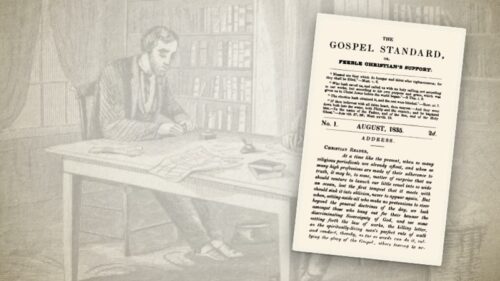-
16 Eternity Of God
ETERNITY OF GOD Is the perpetual continuance of his being, without beginning, end, or succession. that he is without beginning, says Dr. Gill, may be proved from, 1. His necessary self-existence, Exod. 3:14.--2. From his attributes, several of which are said to be eternal, Rom. 1:20. Acts 15:18. Ps. 103:17. Jer. 31:3.—3. From his purposes, which are also said to…
-
The “Old School Baptists” In America
Gospel Standard Magazine No. 102 — June, 1844 — Vol. 10, Pages 161-165 [The letters below were written to our departed friend W. Gadsby, and would have appeared earlier but from the pressure of other matter. Mr. Booth's letter will, we think, be found to contain an interesting account of our American brethren. We do not mean to say that…
-
October 18—Morning Devotion
"And God heard their groaning, and God remembered his covenant."—Exodus 2:24 This is a precious scripture. My soul, put a note upon it. No sigh, no groan, no tear of God's people can pass unobserved. He putteth the tears of his people in his bottle. Surely then he can never overlook what gives vent to those tears, the sorrows of…
-
15 Incorporeality Of God
INCORPOREALITY OF GOD Is his being without a body. That God is incorporeal is evident; for, 1. Materiality is incompatible with self-existence, and God being self-existent, must be incorporeal.--2. If God were corporeal, he could not be present in any part of the world where body is; yet his presence is necessary for the support and, motion of body.--3. A…
-
October 17—Morning Devotion
"And in the cities of Judah shall the flocks pass again under the hands of him that telleth them, saith the Lord."—Jeremiah 33:13 See, my soul, what a blessed scripture is here. Meditate upon it, this morning. Whose hands can these be but Jesus's? For whose are the flocks but his? Is he not in all the scripture said to…
-
14 Spirituality Of God
SPIRITUALITY OF GOD Is his immateriality, or being without body. It expresses an idea (says Dr. Paley) made up of a negative part and of a positive part. The negative part consists in the exclusion of some of the known properties of matter, especially of solidity, and the vis inertiae, and of gravitation. The positive part comprises perception, thought, will,…



